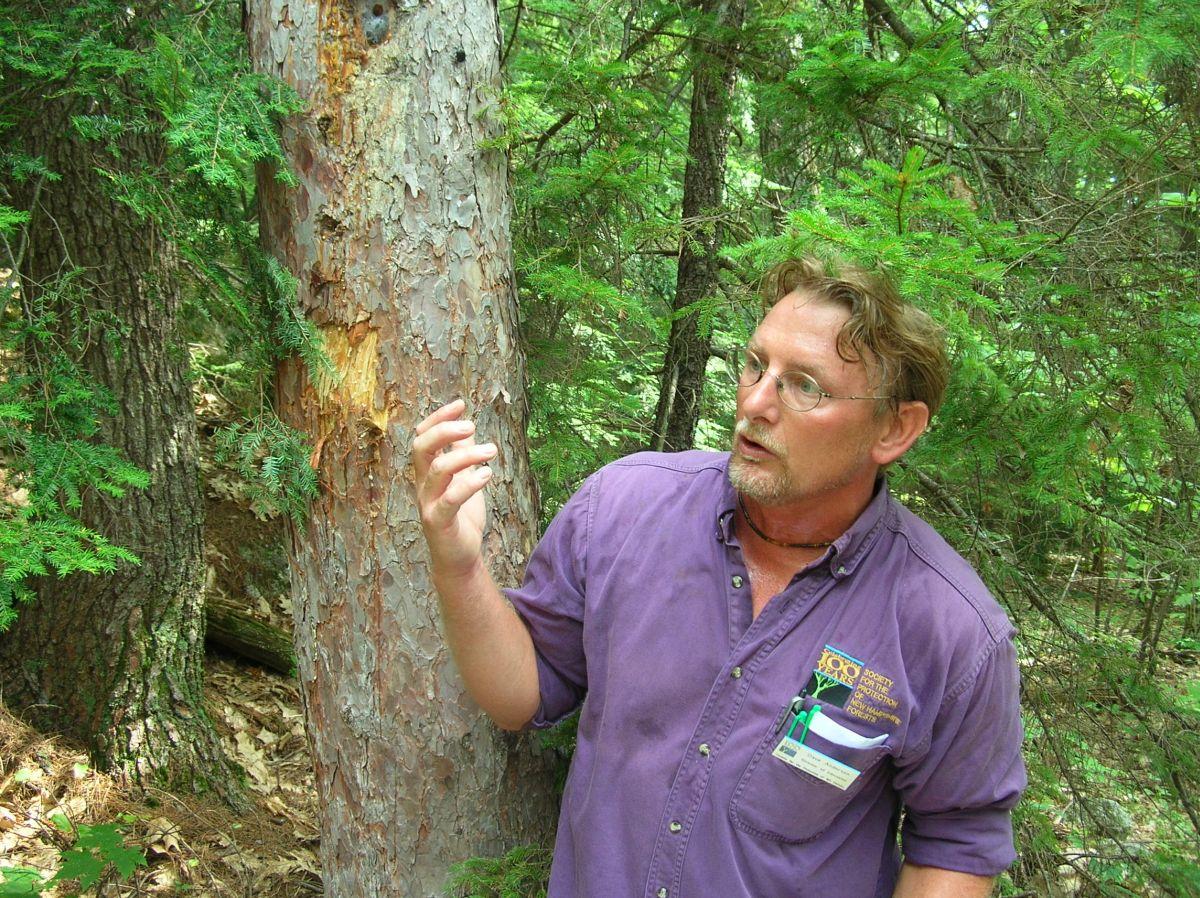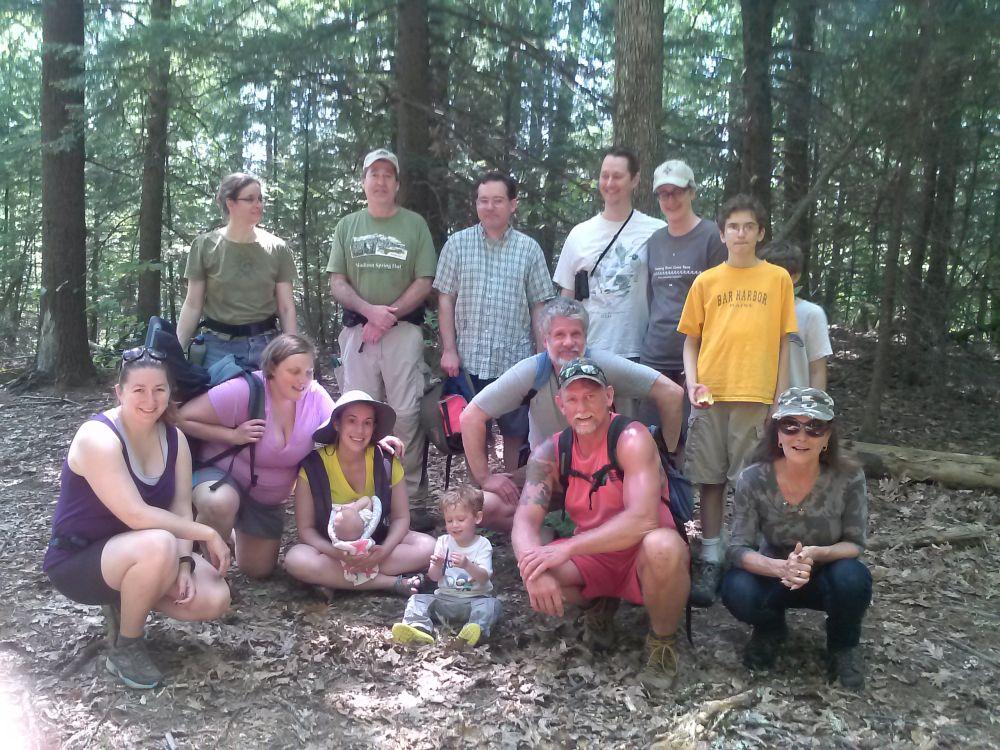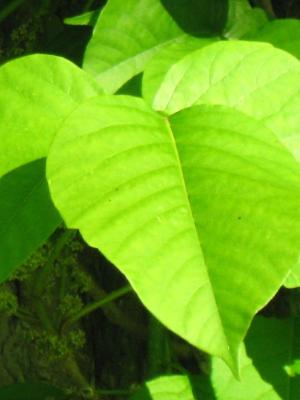When things don't go exactly as planned on field trips
- Tags:
- Recreation

Explaining a bear tree... sans bears (hopefully).
Staff Photo
In the Line of Duty.

It’s safe to say that Forest Society staff members gain some recreational experience in the line of duty. You might assume the line between work and play is arbitrary when “work” leads to one of the Society-owned Forest Reservations now totaling more than 53,000 acres. After all, the expression goes: “Even a bad day in the woods is better than a good day in the office.”
While there’s truth to that, there are numerous weather, wildlife and human hazards in the woods.
Here are a few of my favorite "tales from the field…"
Weather (or not).
February is generally a reliable month for our annual mammal tracking workshop. While hiking on a remote hillside, a sizzling stroke of lightning and simultaneous clap of thunder surprised and startled the class. Yikes – lightning in winter! We immediately adopted an evacuation mode – bushwhacking a beeline for the relative shelter of a dense stand of white pine on a flat area below the exposed hill. We reached a brook swollen by recent rains and melting snow and stood on the bank in snowshoes in the pouring rain and pondered the options. I vividly remember a look of utter disbelief on faces as I took off my snowshoes, waded into the knee-deep, freezing torrent and said “follow me.”
There have been many well conceived and executed hikes to a stunning scenic vista which have culminated with the phrase: “and if it weren’t so rainy and overcast right now, we’d be enjoying one of the finest views in the State!” There is only so much one can do about the weather. As consolation, we offer: “there’s no such thing as bad weather, only bad clothing and bad attitudes.”
One popular annual rite of spring is our annual search for breeding wood frogs, spotted salamanders and their eggs in vernal pools. A deep late season snowpack found our class peering down into a yawning snow crevasse at an open pool of water below. “Trust me” I said “this time last year, this vernal pool was churning with mating wood frogs.” I locate a single spotted salamander to show the class that year. I found it in the flooded basement sump pump well. For a smelt spawning program later that spring, I went to a local bait and tackle shop and bought a few fish to show participants. It’s hard to guarantee animals.
Blackflies and hornets and ticks (oh my)!
In addition to “death and taxes” on a list of life’s certainties, I would add “insects.” If you are reading this story in June, the blackfly welts on your neck are likely still painful.

If you find a tick crawling on the back of your neck, you might suddenly feel as if you are covered with them. You are. I have driven home after a day in the field and plucked-off a tick in each town along the way. My personal record stands at a ten. “Yes officer, I know my car swerved across the yellow line - I was trying to reach a blood-sucking wood tick crawling inside my pant leg!”
Ground hornets are really only a problem in late summer when their nests are full of larvae. In dry years, adult yellow-jackets get particularly ornery and will swarm aggressively in a collective defense of their nests at the slightest provocation. A blundering hike leader likw me who stumbles through an unseen hornet nest is generally spared as are slower hikers in the back of the line. The poor folks hiking in the middle usually bear the brunt of an attack. The scent of venom in the air infuriates bees that are suddenly as thick as mosquitoes. The standard procedure is to scream “Bees! Run!” We once disturbed a huge ground hornet nest beneath a rock on one of the more heavily hiked trails on Monadnock. Several hiking parties on the summit had the same experience. It’s a wonder there were any hornets left with stingers intact to defend that nest at the end of the day. As a public service, I scrawled a crude warning note attached to a stick on the way down. It simply read: “Bees! Run!”

On a warm July evening, our hiking group encountered two young, glossy black bears in a raspberry patch thick with ripe fruit on Sunset Hill. The bumper crop of berries was one legacy of the January ice storm that flailed-opened the canopy. With bear cubs scattering all around us, we quickly retreated uphill to the summit where we met a dog and then his human hiking companion who was carrying two large sticks. I suggested that gathering firewood was pointless - camping and fires are not permitted. He replied: “I just saw a really big bear!” That’d be the mother bear - ahead of us downhill. It was now getting quite dark. Sure enough, on our way down we heard a bear huffing and crashing through the woods. We paused in the darkening forest and then made a remarkably rapid descent. Ok - we ran down the hill.... and then changed our shorts! Don’t laugh. You’d have done the very same thing.
The more unpredictable species: Humans
Some of my greatest "guiding hikes" challenges have not involved weather, insects or wildlife, but other people. Go figure. I remember a trio of women hikers charging hard for the parking lot. One confessed that her friends absolutely refused to pee in the woods although I urged them to find a tree. Once we reached the trailhead, they were dismayed at the lack of a Porta-potty. On an excruciating bumpy drive to the nearest public restroom, I managed to crease the oil pan of my wife’s brand new minivan on a boulder in the road. I sprung a minor leak so those ladies wouldn’t spring a leak of their own.

Once lazy, summer afternoon, an amorous couple found a secluded little beach in a wooded cove of a New Hampshire lake. They pulled their small sailboat ashore and were inspired by the setting. Leading a guided nature walk, I emerged from the woods. And while I fully intended to make eye-contact with the woman facing me, it was difficult as she was clearly distracted. I cleared my throat loudly and spun on my heels to face the group of elderly guests I was guiding. I reversed direction to deliver a short, impromptu, emergency tree identification lesson. We then re-emerged on the beach as the blushing sailors made ready to shove-off. A close call.
Recreational plays an important role in gaining appreciation for the Society’s extraordinary lands. Through adventures in the woods, we learn firsthand from experience. In sunshine, camaraderie and laughter – or swarming mosquitoes, soaked with sweat or pouring rain - the woods fuel our appetites, fill our dreams and call us back to explore - and to learn.
So get out there!
